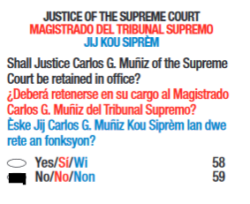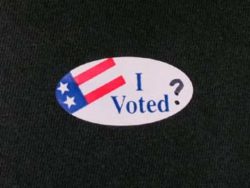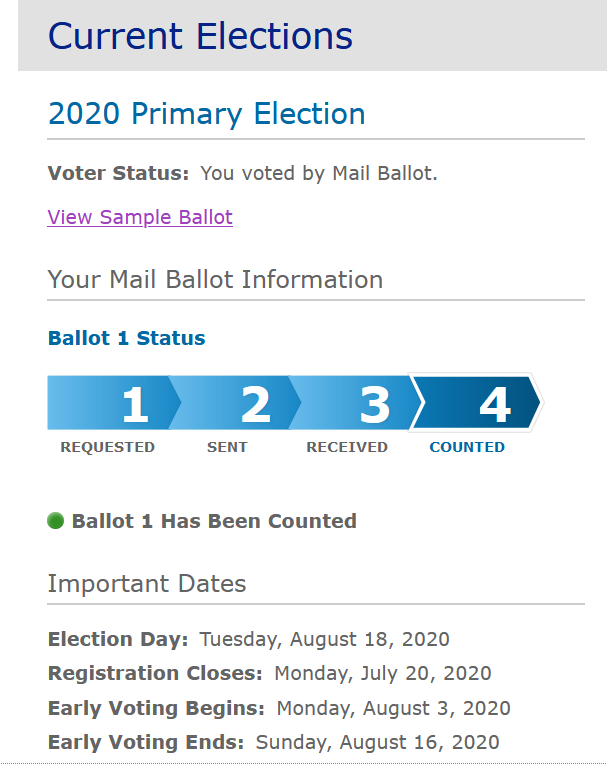 This is the second of three Voters’ Guides for the November 2020 Miami-Dade Ballot. See my Part I for the top-of-the-ballot discussion. This post is primarily about judicial retention elections, although I do briefly discuss the proposed state Constitutional Amendments and County Charter Amendments at the end, and I’ll have more to say about them in a subsequent post.
This is the second of three Voters’ Guides for the November 2020 Miami-Dade Ballot. See my Part I for the top-of-the-ballot discussion. This post is primarily about judicial retention elections, although I do briefly discuss the proposed state Constitutional Amendments and County Charter Amendments at the end, and I’ll have more to say about them in a subsequent post.
Judicial Retention Elections
Here things get interesting. Unlike most law professors I know, I support the idea of judicial elections at the state level as a reasonable democratic check on what I believe should be the expansive power of judges to interpret the state and federal constitutions.
As I’ve often said before, if it were up to me, I’d have the executive branch pick judges with legislative confirmation, followed by a California-style retention election every few years in which there would be an up or down vote on the incumbent. If the vote was down, the executive would pick a new judge. It seems to me that the right question is “has this judge done a good (enough) job” — something voters might be able to figure out — rather than asking voters to try to guess from electoral statements which of two or more candidates might be the best judge.
Florida’s system uses appointment plus retention elections for Supreme Court Justices and District Court of Appeal Judges. So we have six retention elections on our ballot this year: one state Supreme Court Justice, and five Judges on the state 3rd District Court of Appeals.
Long-time readers will know that it takes a fair amount for me to suggest not retaining a Judge, much less a state Supreme Court Justice. But I’m going to do that.
Florida Supreme Court: Justice Carlos Muñiz
Before joining the Court in January 2019, Justice Muñiz served as chief of staff to former Florida Attorney General Pam Bondi and deputy general counsel to former Gov. Jeb Bush. He had no judicial experience, but that isn’t necessarily a bad thing. The Pam Bondi connection, however, is bad, and made worse by his defense of Bondi’s decision to take no action against the Trump University fraud. It worked out for Muñiz, though, as President Trump appointed him general counsel to Education Secretary Betsy DeVos, a job he held when Governor DeSantis named him to the Florida Supreme Court. It’s hard to think of a worse credential than having been a top aide to Pam Bondi, but being one for Betsy DeVos might just qualify. And no, going to Yale Law School (where he joined the Federalist Society), and clerking for José Cabranes, doesn’t make up for any of it.
Governor DeSanits named Muñiz to the Supreme Court as part of a massive re-shaping of what had been a mildly liberal court, and Muñiz did not disappoint – he’s voted reliably with the conservative block starting with supporting a change to the rules of evidence in damage suits to make them less favorable to plaintiffs. And he’s been reliable ever since. That included State v. Poole in which the majority overturned the Court’s own precedent in order to hold that juries do not need to be unanimous to impose the death penalty. Fortunately, just three months later, in Ramos v. Louisiana, 140 S. Ct. 1390 (2020), the U.S. Supreme Court cleaned that up and held that the unanimity requirement applies in state court every bit as much as in federal court.
The Poole decision also served notice that it was open season on precedent generally–something that was prefigured by some earlier decisions to withdraw opinions that had recently been decided by the Court–but before the change in personnel .
I don’t, as rule, think judges, even Justices, should be non-retained for their political leanings. But there comes a point where behavior stops being judicial, and this stuff seems to me to be over the line.
Add in some remarkably low ratings in the Florida Bar poll of lawyers . As the Sun-Sentinel summarizes the data:
[Lawyers are] asked to evaluate the judges on eight attributes including legal knowledge, temperament and impartiality. The Bar only counts the responses of those who profess some knowledge of the judges in question. In the past, judges have almost always scored 80 percent or better in favor of new terms.
… Muñiz posted only 71 percent approval overall, and only 63 percent among those lawyers who said they have “considerable” knowledge of him.
Those are the worst ratings for a justice since Joseph A. Boyd Jr., a figure in the Supreme Court scandal, scored 56 percent in 1980.
That has to give you pause. I’m going to vote AGAINST retaining Justice Muñiz (line 59).
3rd DCA: Retain them all?
These are all conservative judges.
- Monica Gordo was appointed by Ron DeSantis in 2019.
- Eric William Hendon was appointed by Rick Scott in 2018. (He was the first Black justice appointed by Scott — and that only just before the end of Scott’s term as Governor.)
- Fleur Jeannine Lobree was appointed by Ron DeSantis in 2019.
- Thomas Logue was appointed by Rick Scott in 2012.
- Bronwyn Catherine Miller was appointed by Rick Scott in 2018.
But as I said above, I think politics alone isn’t a reason not to retain a judge, so long as they are reasonable in their judgements.
With the exception of Judge Thomas Logue, all of these are recent appointments, so there’s not necessarily a giant body of work from which to form a view. In those cases, I tend to go back to looking at what they did in former jobs, especially if they served in lower courts. If you want to do your own research, good places to start are the Florida Bar judicial retention page (biographies), and the bar poll and Law.com’s biographies. Neither, however, tells you enough.
From what I know about their prior history – and I will not claim to be an authority here – I think Fleur Jeannine Lobree and Bronwyn Catherine Miller should be retained.
The Dade County Bar Association awarded Lobree its Alan R. Schwartz Judicial Excellence Award, its “Put Something Back” pro bono service award and its special public service award. Everything I hear suggests she is a good judge. Justice Building Blog has a summary of her judicial odyssey.
Similarly, Judge Bronwyn Catherine Miller had a good reputation when she served as a Circuit Judge.
Judge Thomas Logue has the longest track record as a judge, and he also had the best score on the bar poll, although no one did especially badly. Judge Logue wrote the opinion in City of Miami v. Robert F. Piper, III, a recent case upholding a trial court’s decision requiring the Clerk of the City of Miami to deliver recall petition against Miami City Commissioner Joe Caroll to the Miami-Dade County Supervisor of Elections. The panel also included judges Fleur Lobree and Eric Hendon but I’m not sure how much credit any of them they deserve for a ruling that seemed inevitable.
Judge Monica Gordo had the lowest score on the bar poll of any of the judges up for retention–79%–among those who claimed to “have considerable knowledge” of her performance, but that 79% was very little below a couple of the others who had 81%. She’s an active UMiami Law alum–here’s a very friendly article about her and her connections to U.M..
I regret to say I’m least well informed about Eric William Hendon. He had a nice partial dissent in the recent Knespler v. Flordia case (while Judge Gordo was in the majority), but that’s not enough to base a recommendation on, other than to say I tend to have a presumption to retain judges.
For an interesting argument that every sitting Judge and Justice deserves non-retention, see Adam Tebrugge, Making the Case to VOTE NO on all FLORIDA JUDGES in 2020 . I imagine he’ll forgive me for the long quotation:
I have now been a member of the Florida Bar for 35 years. My first 23 years I worked almost exclusively as a criminal defense trial attorney handling major cases in the Sarasota Bradenton area. The past 12 years I began handling numerous appeals in the Second District Court of Appeal in Tampa. An appeal is of course important to someone who has been convicted and sentenced to prison and may represent their last chance at freedom. Appeals are also important for accountability, to make sure that trial judges and prosecutors are following the law, and to require new trials when the rules aren’t followed. Therefore, it is very important to ensure these judges are doing their job. In my opinion, they aren’t.
As mentioned above, the District Courts of Appeal are the final stop for almost all cases. So imagine for a second that you were unjustly accused and wrongfully convicted of a serious crime in Florida. Imagine you hired an attorney who agreed with you that serious mistakes had been made in your trial and agreed to represent you on appeal. Imagine that the attorney works on the case for months, files a compelling written brief of arguments in the court, then makes a powerful oral argument to the judges. Now imagine that you get the ruling of the court; “Per Curiam Affirmed,” commonly known as a PCA. You ask the lawyer what it means, and you are told it means that you lost the appeal, that the court is giving no reasons for their decision, and you have no opportunity for any further appeals.
Presently, the District Courts of Appeal in Florida are issuing a PCA in approximately 75% of all cases they hear. This means that three out of four times, the appeal is denied and nobody knows why, except the judges and they’re not telling. This is a terrible state of affairs for the citizens of Florida and for their attorneys. On the other hand, trial judges and prosecutors delight in PCAs, taking them as a stamp of approval that they can get away with anything without consequences.
Attorneys have been complaining about PCAs for as long as I have been practicing. We have a sneaking suspicion that PCAs are used in most cases as a result oriented device to cover up the many errors that occur in a trial court. As such, PCAs have been a tool of mass incarceration, filling our prisons with citizens who were illegally if not wrongfully convicted. Our complaints about PCA’s have fallen on deaf ears, with appellate court judges justifying their use due to their alleged heavy work load. They also claim that PCAs are only used “when the points of law raised are so well settled that a further writing would serve no useful purpose.” Elliott v Elliott, 648 So.2d 137, 138 (4th DCA 1994) In my experience, this statement is utterly and completely false.
I handled homicide cases for the most part, and these trials had numerous legal issues arise with no precedent in Florida law. These were substantial questions that needed definitive responses from the court, yet when I would appear for oral argument the judges showed little interest in the case or the issues. Invariably I would receive my PCA a few days later, giving me little confidence that the judges had considered my issues or even read the arguments. In my view, when Florida appellate judges are issuing PCAs in three out of four cases, they are not doing their job, and therefore should not be retained in office.
My primary argument for voting NO on all Florida judges is that they are simply not doing their job. The problem is institutional and systemic, that is, the system is designed to fail, not to vindicate the constitutional rights of litigants. But why should an individual judge lose their job because of systemic failure? This leads to my next justification for voting NO on all judges — politics. Every judge up for retention in 2020 was appointed by a Republican governor.
In the past I have been leery about politicizing judicial races but that position feels naive now. Without a doubt, Florida judges have been politicized over the past 20 years. These days, membership in the Federalist Society seems like a prerequisite to being named judge. Though they deny it, the Federalist Society is a political organization whose primary goal is to dismantle the regulatory state for businesses while reducing constitutional protections for individual litigants. Judges who come out of the Federalist Society are chosen because they will vote a certain way, not for their fealty to the law.
As arguments go, it’s got some punch, although I’m not on board for this … yet. For one thing, even if we vote these judges out, it’s DeSantis who would appoint the replacements. Yes, that’s true for Justice Muñiz too, but you have to draw a line somewhere.
Constitutional Amendments
There are six Florida Constitutional Amendments on the ballot this year. Two of them are very bad (## 3 & 4). One (# 2) is pretty good. Three (##1, 5, 6) are lightweights, although I think #1 in particular deserves a No vote.
I’ll say more about all these in a subsequent post, but if you’re in a hurry to vote now, here’s how I’m voting and a thumbnail explanation as to why:
1 No – Citizenship and age limits on voting (I don’t like the age limit, constrains local experimentation with 16 year-old-voting in local elections. Plus the amendment is just a scare tactic to drive conservatives to the polls — it’s already the law that you have to be 18 and a citizen to vote. We shouldn’t encourage this cynical use of the state Constitution.)
2 Yes – Provides for slow raises in the state minimum wage. Too slow, but better than the nothing we’re getting from the legislature.
3 NO! – Would replace current primary election system with ‘Jungle Primaries’. I hate the ‘Jungle Primary’ for reasons I will explain.
4 NO!! – Would make it even harder to surmount the gerrymandering of the state legislature with progressive constitutional amendments (like the minimum wage, or the felon voting restoration amendment from last election).
5 Yes (?) -Technical change to save-our-homes homestead exemption (but reasonable people could disagree on grounds it will cause a very small loss of revenue to local government).
6 No (but reasonable people could easily disagree) – Clutters the State Constitution with another small-bore feel-good tax break, this time for surviving spouses of people with combat-related disabilities – this is something that should be done by legislation.
Miami-Dade Charter Amendments
More about these in the next post.
Referendum 1 – Create office of Inspector General – Yes – line 212.
Referendum 2 – Delay elections to replace ‘resign to run’ officials to general election – Yes – line 214.
Referendum 3 – Nonpartisan election of Sheriff, Appraiser, etc – No – line 217.
As I said above, I plan a third post, tomorrow I hope, with more detailed discussion of my reasons for the recommendations about the Constitution and Charter amendments.
UPDATE: Continue to Voters’ Guide to the November 2020 Miami-Dade Ballot, Part III: State Constitutional and Charter Amendments.

 People have been emailing and DMing me asking for the downballot recommendations already. I’m glad to see that people who are voting by mail are taking seriously the suggestion that, given all the hiccups with the Postal Service, this is the year to get those ballots in the mail as early as possible – or maybe take them personally to a dropbox at an early voting center when those open up in less than two weeks.
People have been emailing and DMing me asking for the downballot recommendations already. I’m glad to see that people who are voting by mail are taking seriously the suggestion that, given all the hiccups with the Postal Service, this is the year to get those ballots in the mail as early as possible – or maybe take them personally to a dropbox at an early voting center when those open up in less than two weeks.